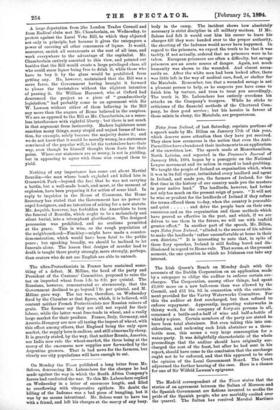On Monday the Times published a long letter from Mr.
Sams, denouncing Mr. Labouchere for the charges he had made against the way in which the South Africa Company's forces had conducted the war. To this Mr. Labouchere replied on Wednesday in a letter of enormous length, and filled to overflowing with vituperative epithets. No doubt the killing of the Indunas was a bad piece of bungling, but it was by no means intentional. Mr. Selous went to have tea with a friend, and left his charges at the mercy of any busy- body in the camp. The incident shows bow absolutely necessary is strict discipline in all military matters. If Mr.. Mons had felt it would cost him his career to leave his. charges till they were handed over to the proper authority,. the shooting of the Indunas would never have happened. In. regard to the prisoners, we expect the truth to be that it was- tacitly, if not actually, ordered that no prisoners were to be- taken. European prisoners are often a difficulty, but savage. prisoners are an acute source of danger. Again, not much- humanity was shown to the wounded. And almost necep- sarily so. After the white men had been looked after, there- was little left in the way of medical care, food, or shelter for- the Matabele. Remember, too, that a wounded savage is not-• a pleasant person to help, as he suspects you have come to finish him by torture, and tries to treat you accordingly.. The truth is, Mr. Labouchere has entirely overdone his attacks on the Company's troopers. While he sticks to- criticisms of the financial methods of the Chartered Com- pany, he does good service ; but his heroics in favour of those saints in ebony, the Matabele, are preposterous.


































 Previous page
Previous page